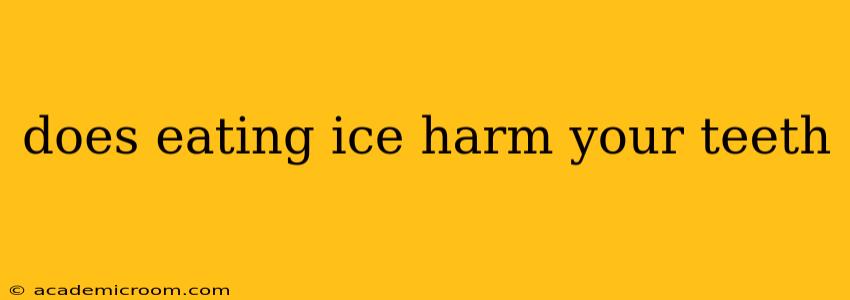Many of us enjoy the refreshing crunch of ice, especially on a hot day. But is this icy treat secretly damaging our teeth? The short answer is: yes, it can. While an occasional ice cube probably won't cause significant damage, regularly consuming ice can lead to several dental problems. Let's delve into the specifics.
How Does Eating Ice Damage Teeth?
The primary reason ice harms teeth is its extreme hardness. When you bite down on ice, you're applying significant force to your enamel, the hard outer layer protecting your teeth. This force can cause:
-
Cracks and Chips: The most immediate and visible damage is the fracturing of enamel. These cracks can be microscopic initially, but they gradually weaken the tooth, making it more susceptible to decay, sensitivity, and even breakage.
-
Enamel Erosion: Repeatedly chewing on ice can wear down the enamel over time, much like sandpaper. This erosion exposes the dentin, the softer layer beneath the enamel, leading to increased tooth sensitivity.
-
Increased Tooth Sensitivity: As enamel erodes, the nerves within the tooth become more exposed. This leads to heightened sensitivity to hot, cold, sweet, and sour foods and drinks.
-
Increased Risk of Cavities: Cracked enamel provides easy entry points for bacteria, increasing the risk of cavities and decay.
What About Other Types of Ice?
The same risks apply to all types of ice, whether it's crushed ice, ice cubes, or ice from frozen drinks. The hardness remains the constant threat to your enamel.
Can I Still Enjoy Ice Occasionally?
Moderation is key. An occasional ice cube in your drink probably won't cause significant harm. However, if you habitually chew on ice, consider cutting back or finding alternative ways to cool down.
How Can I Protect My Teeth From Ice Damage?
-
Limit Ice Consumption: The best way to protect your teeth is to reduce your ice intake.
-
Choose Alternative Coolers: Try using ice-cold water, frozen fruit, or sugar-free popsicles instead of chewing on ice.
-
Regular Dental Checkups: Visit your dentist regularly for checkups and cleanings. Early detection of enamel damage can prevent more serious problems.
What Are the Signs of Ice-Related Tooth Damage?
-
Sharp Pain When Chewing: This indicates potential cracks or enamel erosion.
-
Increased Tooth Sensitivity: Experiencing pain when consuming hot or cold foods or drinks suggests enamel damage.
-
Visible Cracks or Chips: If you notice chips or cracks on your teeth, consult your dentist immediately.
Is Ice Worse Than Other Hard Foods?
While other hard foods like nuts and hard candies can also damage teeth, ice presents a unique risk due to its extreme hardness and temperature. The combination of these factors can exacerbate the damage.
Can I Fix Ice-Damaged Teeth?
Depending on the severity of the damage, various treatments are available. These include fillings, crowns, or bonding, depending on the extent of the damage. Early intervention is crucial for the best outcome. If you suspect ice has damaged your teeth, consult your dentist immediately.
Remember, prioritizing your oral health is crucial. While enjoying the occasional refreshing ice cube is fine, habitual chewing on ice can lead to significant dental problems. Make informed choices and consult your dentist if you have any concerns.
